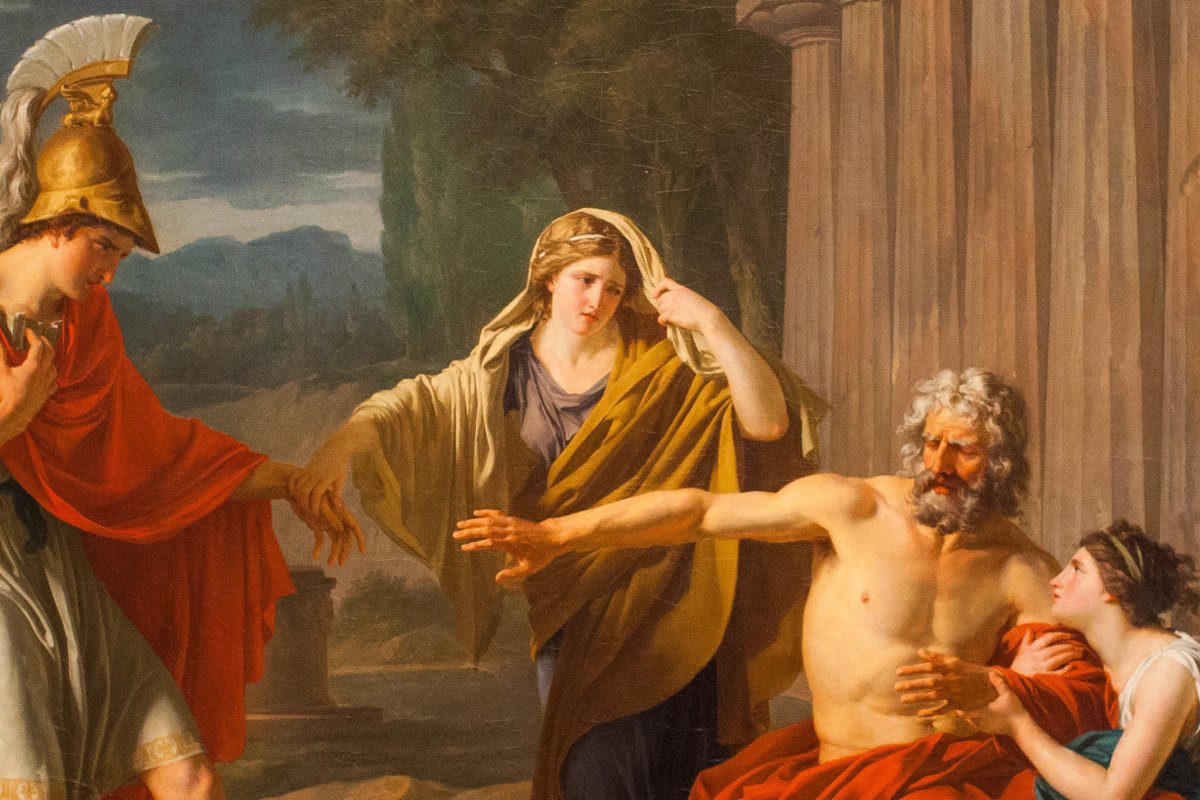
Oedipus Then and Again … And Again
Pasolini’s Edipo Re reminds us of the boldness at the heart of humanistic learning: the conviction that the texts we decide to study should matter not just for us but for anyone.
Pier Paolo Pasolini (1922-1975) – poet, translator, actor, and director/writer/producer in the cinema, self-proclaimed “Marxist Catholic” and “atheist” – wrote and directed in 1967 an adaptation of Sophocles’ Oedipus Rex. Tucked between several of his better known adaptations of classic literary works (The Gospel According to Matthew (1964) and his adaptations of Chaucer, Boccaccio, and the Arabian Nights in the 1970s), Pasolini’s Edipo Re rewards careful viewing and is not incidentally a sterling example of the chief justification for the humanities (including the study of religion): namely, that cultural heritages only matter to us when we engage them; and in turn that a culture’s depth is a function of the intensity and the honesty of that engagement. Only then do we truly think, and feel, and live.
Oedipus Rex has often been read and performed, and usually celebrated. Aristotle judged it the best Greek tragedy (superior to anything else Sophocles wrote, and better than anything at all written by Aeschylus or Euripides). Sigmund Freud was of course obsessed with it. Samuel Taylor Coleridge judged Oedipus to be, together with Ben Jonson’s Volpone and Henry Fielding’s Tom Jones, one of the three most perfect plots ever composed. Many have noted its implicit presence in William Shakespeare’s Hamlet. Its transformative influence is not restricted to philosophy, psychoanalysis, Renaissance revenge tragedy, or Romanticism: the list could go on and on.
Pasolini’s particular rendition offers a fealty to the play that is at once genuine yet decidedly revisionist. Unlike the original, his movie has two parts. Part One presents the “back story” of Oedipus before he becomes King; Part Two enacts the play very nearly as Sophocles wrote it (with some modest staging liberties and an extension of the ending to bring the blinded Oedipus to contemporary Rome). Pasolini’s presentation of the “back story” brings “onstage” what is at once crucial yet only invoked in Sophocles’ play. We are introduced to Oedipus as a beautiful but obdurately interfering baby, adored by his mother and cursed by his father; we watch while as a helpless infant he is removed from his birth home with the intent of leaving him to die in the wilderness; we then see how he is saved by a bumblingly sympathetic shepherd through whom he is adopted by a family who raise him as their own; and – in the one significant departure from what Sophocles has his characters recount for us – we see Oedipus as a competitive teenager who cheats in a discus competition in order to win. We also see his violent confrontation on the road with the King he does not know to be his father Laius, and his consequent ceremonial marriage to the King’s widow who is of course his mother Jocasta.
This signal departure from Sophocles’ play – about half of Pasolini’s film – makes literal the part of the story that most captivated Freud and still piques the curiosities of those who view or read Sophocles’ play. Pasolini makes us see what Sophocles only alludes to: the twisting and turning process by which Oedipus came to kill his father and marry his mother. Pasolini’s pacing of this is deliberate, almost matter-of-fact, in significant contrast to the effect of its invocation in Sophocles’ play.
Pasolini then brings his viewer into the more familiar world of the actual play in the second part of the film. When Oedipus addresses the desperate citizenry about the curse, we have first-hand familiarity of his impetuousness. We come to regard his fate as sealed not chiefly or even primarily by the play’s action but by a more finely elaborated sense of what Aristotle termed harmatia – a kind of willful arrogance. Pasolini accentuates the role that Oedipus’ own humanity plays in his fate. At the same time, Pasolini does not allow us to distance ourselves from his Oedipus: the kind of catharsis Aristotle saw in the play, in which we feel a resolving pity and fear, is not the dynamic Pasolini fosters. The play is at once entirely recognizable to us and transformed: we are meant to see ourselves and our own world in Pasolini’s cinema vérité.
This combination of recognition and transformation runs throughout the film. It is punctuated by the use throughout the film of unanticipated moments of indiscriminate, uproarious laughter. It is hard to imagine an audience laughing uproariously at any (reasonably proficient) stage production of Oedipus Rex. In Pasolini’s film, however, both the ostensible deities and humans, including Oedipus, indulge in it. This opens up the possibility that the story is at once true and absurd; and that its absurdity is lost on no one, whether human or divine. Equally striking is the film’s portrayal of Oedipus’ mother/wife, Jocasta. In a superb directorial decision, Pasolini cast Alida Valli as Jocasta – a brilliant actress whose performance is at once trans-generational (she looks old when young, and young when old) and remorselessly ambivalent (her asides to the camera can be construed as knowing or as helpless).
In all his cinematic adaptations, Pasolini sought to retell his chosen stories in this way: to be as true as possible to the story in all its details while trusting that it can be told in a contemporary argot. There is in his adaptations a confidence in the capacity of works like Oedipus to “stand the test of time.” The key for Pasolini about adaptation can be put in negative terms: it is not the attempt to recreate a past that is far gone, nor is it to change the story in an effort to make it responsive to a specific present. Put positively, it is a form of trust: the nervy conviction that what it means to be a “classic” is to speak on one’s own terms to those who do not share one’s own time. In this way, Pasolini suggests, Sophocles really can speak to us.
Pasolini’s Edipo Re reminds us of the boldness at the heart of humanistic learning: the conviction that the texts we decide to study should matter not just for us but for anyone. In this respect, the humanities must be a collective enterprise, an ongoing debate or exchange about what should matter for everyone. If liberal democracy, the liberal arts, and liberal religion find themselves on the cultural ropes, it may have to do with a collective failure of nerve to assert the conviction that what matters to me should also matter to you.
One sterling instance of this insistence is the eloquent conclusion of Zora Neale Hurston’s Their Eyes Were Watching God (1937). Here is Hurston’s own Oedipus, the magnificent Janie Crawford, surveying all that has happened to her:
The day of the gun, and the bloody body, and the courthouse came and commenced to sing a sobbing sigh out of every corner of the room; out of each and every chair and thing. Commenced to sing, commenced to sob and sigh, singing and sobbing. Then Tea Cake came prancing around her where she was and the song of the sigh flew out the window and lit in the top of the pine trees. Tea Cake, with the sun for a shawl. Of course he wasn’t dead. He could never be dead until she finished feeling and thinking. The kiss of his memory made pictures of love and light against the wall. Here was peace. She pulled in her horizon like a great fish-net. Pulled it from around the waist of the world and draped it over her shoulder. So much of life in its meshes! She called in her soul to come and see.
"Oedipus at Colonus" by Thomas Hawk is licensed under CC BY-NC 2.0.


